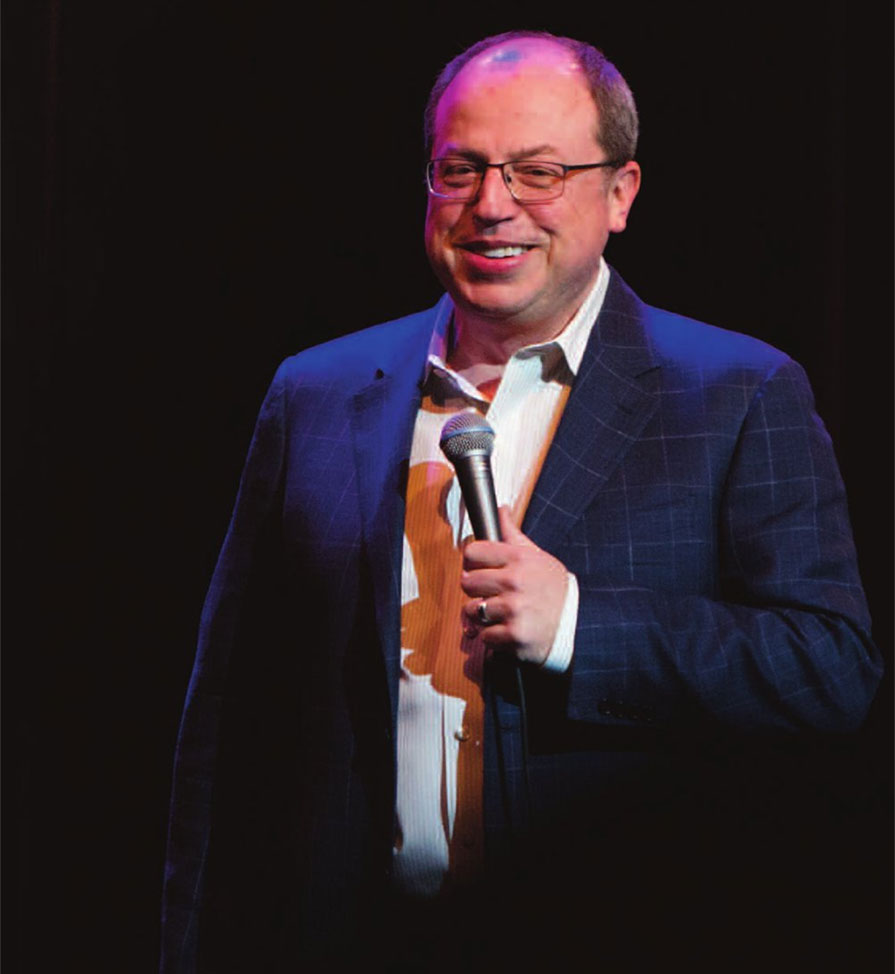By Iris Winston and Photos by Dane Roy
Life Before and After Corner Gas
Brent Butt still most at home with standup comedy.
Being serious about comedy saved Brent Butt from hanging around the local gas station either because he was out of work and had time on his hands or because he was employed there. Instead, the creator of the hit television sitcom Corner Gas — soon to be acknowledged as one of Canada’s top comedians — spent the six seasons that the show ran on CTV hanging around the gas station in the fictional hamlet of Dog River. As he puts it, he became “an instant success” after 17 years, barely making ends meet through his first few years as a professional comic. But the goal he had set when he was just 12 years old eventually came to pass for the Tisdale, Saskatchewan, native.
“I was very young when I decided that the path I wanted to follow in life was to be a standup comedian,” says Brent, who has won numerous Canadian Comedy awards as a comic and for his role as station manager Brent Leroy in Corner Gas, as well as for creating and co-writing the series.“The rest of my life from that point on was killing time until there was an opportunity to follow my dream.”
His various early occupations included doing artwork, advertising design and darkroom work for two newspapers, the Tisdale Recorder and the Melfort Journal, and founding a comic book with a partner (Colin Oleksyn, also from Tisdale). Despite winning a prestigious Golden Eagle award (the Oscar equivalent in the comic-book universe), the publication,Existing Earth, folded after two issues, because of lack of funds.
Another filler job (in both senses) was a short stint doing drywalling, followed by an even shorter stint as a student of animation at Sheridan College in Ontario. “I left during orientation week,” says Brent.“I had pursued the notion of going to Sheridan because people said that if I was going to do comedy, I needed something to fall back on. I had to think of something that I didn’t hate doing and that was drawing. I loved cartoons and animation — I used to draw animated cartoons on the corners of my textbooks in school. You could flip through the pages and make the cartoons move. Anyway, I applied to Sheridan and was accepted.”
“That was exciting,” he says.“But when I got there,I felt it was a waste of time. This was before the days when computers were used in animation. Everything had to be hand drawn and that seemed unbearably tedious to me. I knew that I didn’t want to do that for the rest of my life and that if I didn’t do standup,I would be miserable.” He says that he was also aware that if he“got sucked into the security of a job”he might never break free.
“I decided that I had to dive in while I was young and, if it didn’t work out, I could pick up the pieces when I was 30.” He was buoyed by having already had some success in performances for fellow students while in high school.
“The reaction was encouraging,” says Brent. “I talked and they laughed. At least, I could keep them distracted and amused.That was the nuts and bolts of it.”
Even before his high-school gigs — which he admits were much more successful than his academic achievements — he had delivered regular standup routines on home turf for his family.“I grew up in a household where the priority was making people laugh,” he says.
“We didn’t have much money, so we entertained each other.” As the youngest in the family with six older brothers and sisters, Brent says, “Making them laugh was huge. They didn’t give it up easily, so you knew it was legitimate if they laughed.” He points out that his family background also provided the stability he needed to cope with difficult times along the way to international recognition as a professional comedian, actor and writer.
“My parents and my brothers and sisters were very entertaining people,” he says.
“We always had a lot of laughs. And I never met two happier or more contented people than my mom and dad. From their standpoint, they probably worried about how to pay the bills, but they never let us see that.They always had time for each other and for all of us. I credit growing up in the environment that I did with helping me get through the leanest part of my career.For the first 10 or 15 years when you are not making enough money to get by, you get by somehow.”
The official beginning of his standup career dates from his appearance at a comedy club in Saskatoon in February 1988 during an amateur night. This was quickly followed by appearances with theYukYuk’s chain in western Canada.
“I seemed to be able to do standup and was having some success early on,” recalls Brent, who will soon be returning to Montreal to appear in the Just for Laughs comedy festival after appearing there regularly in his pre-Corner Gas days.
“I was also fortunate that this time — the late 1980s and early 90s — was a really good time for standup. It was a real growth industry and anybody who claimed to be a comedian would get offered a little bit of work. So,I was able to scratch out a very meagre existence early on.”
By 1989, Brent had relocated to Toronto. After trying his luck there for a few months, he moved to Los Angeles.
“Taking a swing at big-time show biz is what you did, but I didn’t really like being there.When I was on stage at a club in LA, I found that being myself didn’t work.Though I could change to be more of what was expected of me, get laughs and be booked back, it didn’t feel authentic to me.”
His quiet wit and observations of people’s quirks, combined with self-deprecating humour and avoidance of swearing and dirty jokes, were very different from the style most standup comics used in their acts.
“My humour is not always self-deprecating,”he cautions.(Check out The Butt Pod for examples.) “If it’s just that, it really becomes navel-gazing and you lose your voice.You have to look out and poke fun at everything.The point of view I take, because it’s fairly accurate, is to say that I don’t understand something. It’s a little more valid. Often, the things I don’t like, I legitimately don’t understand.”
He adds that it became clearer with each assignment that neither the tone nor the work he did in the U.S. was a good fit for him.“In the States, I was playing clubs to get seen,” he explains.“My actual standup work was in Canada.”
After a month’s worth of bookings inVancouver,he decided to stay.“I just fell in love with Vancouver and just never wanted to be anywhere else. Everything about this city feels right to me.”
“I remember the first winter I was here, there was one day when it was minus one,” he laughs. “That was the lead story on the news. I thought, if there’s a city in Canada where that’s the lead story in February, I’m staying.That’s where I want to be.”
The next major marker in his life was Corner Gas. In creating the show, Brent began with the premise of what his life might have been like had he not become a professional entertainer. If there is anyone out there who has not seen any samples of the hit show, which averaged a million or more viewers of each episode during its six seasons between 2004 and 2009, with reruns still airing regularly, here is the scenario:
Set in the fictional town of Dog River, Saskatchewan, the sitcom focuses on the lives of the inhabitants, particularly the owner of the only gas station for 60 kilometres, his parents and best friend, the sales clerk at the gas station’s convenience store, the owner of the adjacent café and the police force (of two). Although the original name of Tisdale, the farming town two hours east of Saskatoon, where Brent grew up, was Doghide — after the Doghide River, which runs through it — he says that it was not the model for the hamlet in Corner Gas.
“Tisdale is a much bigger town than Dog River,”he says.“It’s more like the tiny hamlets that surround Tisdale.” (For the record, Doghide was renamed Tisdale after the railway came to the agricultural community, in honour of Canadian Northern Railway employee F.W.Tisdale. Brent Butt is now listed as one of the community’s most famous sons.) Corner Gas, which was an instant success, soon became Canada’s most popular sitcom and went on to become the top comedy show in 26 countries.
In addition, says Brent,“Corner Gas was more of a vindication than anything else. I remember that even before starting in standup, I was pulling for there to be really strong Canadian sitcoms. I always heard people say the market wasn’t there to do sitcoms in Canada. I would say, ‘Don’t tell me we can’t, just because we haven’t’.”
Not only did the huge success of Corner Gas prove his point, in a number of ways, it has defined the direction of his life.He met his wife,Nancy Robertson, on the show.(She plays Wanda, the retail clerk in the gas station’s convenience store.) Since their marriage in 2005, they co-starred in two seasons of his next successful sitcom, Hiccups.
Although interest in Corner Gas continued unabated over six years,Brent, (also the show’s executive producer) chose not to go on for a seventh season. Over its lengthy run, the show won six Gemini awards and, when the series finale aired on April 13, 2009, it was watched by some three million people. BradWall, then premier of Saskatchewan, named April 13 Corner Gas Day in the province. Both he and former prime minister Stephen Harper made cameo appearances during the series.
In the proclamation, the premier said, “For six great seasons, Corner Gas has welcomed people from across Canada and around the world to our province and made short work of the misconception that there’s ‘not a lot going on’ in Saskatchewan. We want to thank Saskatchewan’s own Brent Butt, the Corner Gas producers, cast and crew for many hours of laughter. Their stories have really captured the spirit of this great province and shown off Saskatchewan to the world.”
Brent chose to end on this high note. “I felt we should wrap the series up before it got old and tired and weak.The notion was always to come back a few years later and make a movie and that ended up happening. The response to the movie was about 50 times greater than we’d anticipated.”
Fans descended on Rouleau, Saskatchewan, where both the movie and the original show were shot, and on November 25, 2014, Corner Gas the Movie opened in Regina and then on more than 100 screens across the country.All members of the original cast reprised theirTV roles. The enthusiastic reaction to the movie led executives at CTV to request more of the original format.
“They said there’s obviously still an appetite for this show and asked if we would consider making more episodes,” says Brent.
“But my partners and I didn’t feel we should do more of the same. But we didn’t want to stop giving people what they liked about Corner Gas.Giving the same humour but offering something different through animation was a pretty natural transition.”
So, the first season of 13 episodes of the animated version of Corner Gas, written by Brent and David Storey, ran from April 2, 2018.
“Season one was very successful,”says Brent, pointing out that the fantasy sequences frequently used in the regular format were even more effective in the animated version.
“It was the highest rated show on the Comedy Network and it’s moved over to the main networks now. We’re now in the throes of writing the next 13 episodes for season two. Learning to write in a new format can be tricky so that’s been taking all my time and focus. As soon as production is over, I head out on the road for standup.” Clearly, retirement is not on the radar for the 52- year-old.
“I can see myself retiring from TV and film if I get old enough and tired enough, but not from standup,” he says, noting that he was encouraged to see comedian George Burns performing standup routines at 92.
“If you play hockey, you have to wrap it up at some point. If you’re blessed with longevity and your mind keeps going you’re able to go on doing standup.” And then, there’s always a chance to hang around the local gas station.







